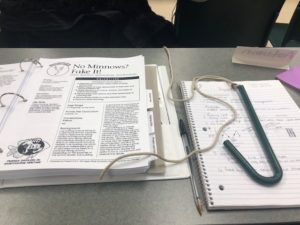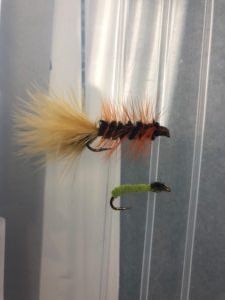Attending The Project Fish Instructor Training
Have you heard of Project Fish? Project F.I.S.H stands for, Friends Involved in Sports Fishing Heritage. Their vision statement is as follows; ( http://www.projectfish.org/main_program.html )
“To initiate and provide fishing education and fishing skills to interested adults and youth from Michigan’s many diverse populations. This will preserve a natural heritage that ensures the future of fishing, which includes natural resources and environmental awareness, ethical fishing practices, fishing stewardship, and positive developmental activities for children, families, and the community.”
The person responsible for running this program goes by the name of Mark Stephens. He is a very knowledgeable and friendly instructor who has been with the program for many years. The program works through a statewide committee with representatives from Michigan 4-H Youth Programs, Michigan State University Dept. of Fisheries and Wildlife, Michigan Dept. of Natural Resources Fisheries Division, MUCC, and many more.
 On March 5th & 6th, Max Bass (Youth Camp Director) and I, attended a Project Fish Instructor Training at Michigan State University. Others that were in attendance at the event were; school teachers, outdoor educators representing a county, and a retired gentleman that wants to volunteer. I personally do not teach in a classroom or work for a specific program. I know I have the power to volunteer, and that I could use these skills taught to us to further the youths’ involvement in fishing.
On March 5th & 6th, Max Bass (Youth Camp Director) and I, attended a Project Fish Instructor Training at Michigan State University. Others that were in attendance at the event were; school teachers, outdoor educators representing a county, and a retired gentleman that wants to volunteer. I personally do not teach in a classroom or work for a specific program. I know I have the power to volunteer, and that I could use these skills taught to us to further the youths’ involvement in fishing.
The training was divided up into four sections, the first being Aquatic Ecology. We went over the importance of understanding aquatic ecology by forming key terms into fun games/activities. One activity, for example, was called “think like a fish” the objective was exactly how it sounds. As a fish, what did you need within an aquatic habitat, in order to live? (split into two groups, write as many terms as you can think of). The activity taught us that there are four major categories to think of; food, water, shelter, and space. The second section of the training was about People and Fish. With this, we learned about a fun activity/game called “Go Fish.” The game taught us how a fishes ecosystem can balance, by practicing ethical fishing and habitat management. This was followed up by a conversation about fishing laws/regulations and how to handle certain situations based on a scenario.
The third section was geared towards tackle crafting. First, we learned the parts to a hook and how to safely handle a hook. Next came time to actually practice crafting several different types of tackle as well as learning how to tie different knots. The final section of the training was centered around angling skills. At a gym, we learned how to cast using 3 different methods (pop can, pipe, rod/reel). All three methods range in price, the pop can method of fishing being the cheapest and simplest for kids. We then went over safe ways to carry and cast your line when fishing, this can be very important when teaching kids. The day ended with playing a few rounds of the backyard bass casting game.
parts to a hook and how to safely handle a hook. Next came time to actually practice crafting several different types of tackle as well as learning how to tie different knots. The final section of the training was centered around angling skills. At a gym, we learned how to cast using 3 different methods (pop can, pipe, rod/reel). All three methods range in price, the pop can method of fishing being the cheapest and simplest for kids. We then went over safe ways to carry and cast your line when fishing, this can be very important when teaching kids. The day ended with playing a few rounds of the backyard bass casting game.
Kids can learn through hands-on activities. If you can tie an important message in with a game/activity, then you hit the jackpot. As an adult, I too was amused by all the activities and games and how each taught a lesson. If I were to try and include everything I learned through Project Fish, it would not fit within this blog, it would have made a much better short story. You too can learn from this program and pass on the knowledge to our youth. The information Mark teaches is for you to customize into your own program. Check out his webpage for more information, event details, and instructor training.
The post Attending The Project Fish Instructor Training appeared first on Michigan United Conservation Clubs.
Recent Posts



